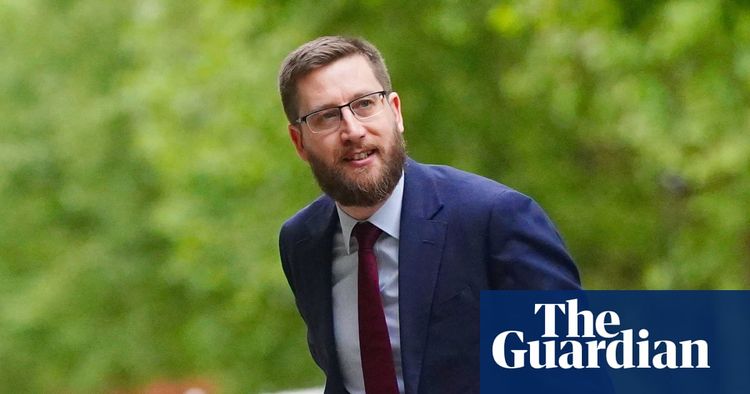UK’s top civil servant, Simon Case, to stand down on health grounds

Simon Case, the cabinet secretary, has officially revealed that he will step down from his position as the UK's top civil servant at the end of this year.
In an email sent to the civil service, Case, who has worked with four prime ministers and 120 cabinet ministers during his time in the position, stated that he would remain in his role as the search for his successor begins.
His long-scheduled exit due to health issues follows a chaotic few weeks for the Downing Street team, filled with harmful leaks and internal conflicts. It's believed that Keir Starmer has become more and more exasperated.
Cabinet ministers and high-ranking advisors have called on the prime minister to take control of the situation, warning that failure to do so could jeopardize the stability of the government.
The exit of Case, who reportedly had a strained relationship with Starmer's chief of staff, Sue Gray, allows the prime minister a chance to start fresh.
After the announcement, Starmer expressed his gratitude to Case for his “support” and the “many years of dedicated service to our nation,” stating, “We are saying goodbye to an exceptional public servant.”
"Simon is absolutely doing the right thing by prioritizing his health at this time, and he should feel supported by the good wishes of the government and everyone he has served throughout his impressive career."
Case had previously indicated that he planned to depart in the upcoming year due to health issues. However, the absence of an official statement prevented No 10 from effectively beginning the search for his replacement.
In his communication to the civil service, Case mentioned, "As a lot of you are aware, I have been receiving medical treatment for a neurological issue for the past 18 months. Although my determination is strong, my physical health isn't quite keeping up."
“It’s unfortunate that I need to clarify this, but my choice is entirely based on my health and has nothing to do with any other factors.”
In his four years in office, Case has managed the government's handling of both the Covid pandemic and the rising cost of living. He has also stood as a representative for the civil service during a period when it faced frequent criticism from top Conservative advisers and cabinet members.
Nonetheless, he encountered backlash for receiving no punishment during the Partygate scandal, while many lower-level civil servants were fined. Additionally, he was criticized for erasing WhatsApp messages during the COVID crisis, even though the COVID inquiry released some of his messages, which included his remarks labeling the government at that time as a "terrible, tragic joke."
In his email, Case expressed that we should avoid the urge to judge or get involved in genuine democratic discussions. Instead, we ought to leave political matters to the politicians and show our strong commitment to democracy by supporting the elected government in power.
Last week, The Guardian highlighted that tensions in No 10 are expected to escalate following Starmer’s return from his visit to the United Nations in New York, amid concerns regarding issues involving Gray within the government.
Starmer is receiving private suggestions to hire a new cabinet secretary from outside the civil service. They believe this person could bring a fresh perspective to the usual role, especially as discussions about who will replace Case are still ongoing.
The job posting for his successor in the £200,000 position was published on Monday, highlighting as the main requirement the ability to gain the trust of the Prime Minister and the cabinet.
Oliver Robbins, the ex-Brexit negotiator closely associated with Sue Gray, who is Starmer's chief of staff, has frequently been mentioned as a potential leader of the civil service. Additionally, other names being floated from within Whitehall include Tamara Finkelstein, the permanent secretary at the Department for Environment, Food and Rural Affairs, and Jeremy Pocklington, who oversees the Department for Energy Security and Net Zero.
Case was born and raised in Bristol, where he received his education. During his time at Cambridge University, he focused on the history of intelligence agencies while pursuing his undergraduate studies. He went on to earn a PhD at Queen Mary University of London, working under the guidance of political historian Peter Hennessy, who praised him for his remarkable intellectual strength and curiosity.
Case, a married man with three daughters, may have seemed like a likely candidate for a position in the security services. However, in 2006, he chose to enter the civil service, eventually advancing to prominent security positions during David Cameron's time in office at Number 10.
In 2015, he was enticed to take on the role of director of strategy at GCHQ, but after less than a year, he went back to work with Cameron as his main private secretary.
It was said that Case had a good relationship with Cameron, but wasn’t as warm with Theresa May. During her time as Prime Minister, he was tasked with yet another challenging assignment: figuring out a way to address the Irish border issue after Brexit.
In 2018, amidst the turmoil of Brexit, Case was appointed as private secretary to Prince William. A little over two years later, he returned to Downing Street to take on one of the most challenging roles: cabinet secretary for Boris Johnson. He continued in this position during the tenures of Liz Truss and Rishi Sunak, but with a Labour government coming in and his own health issues, it became clear that it was time for him to step aside.











































